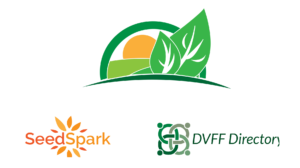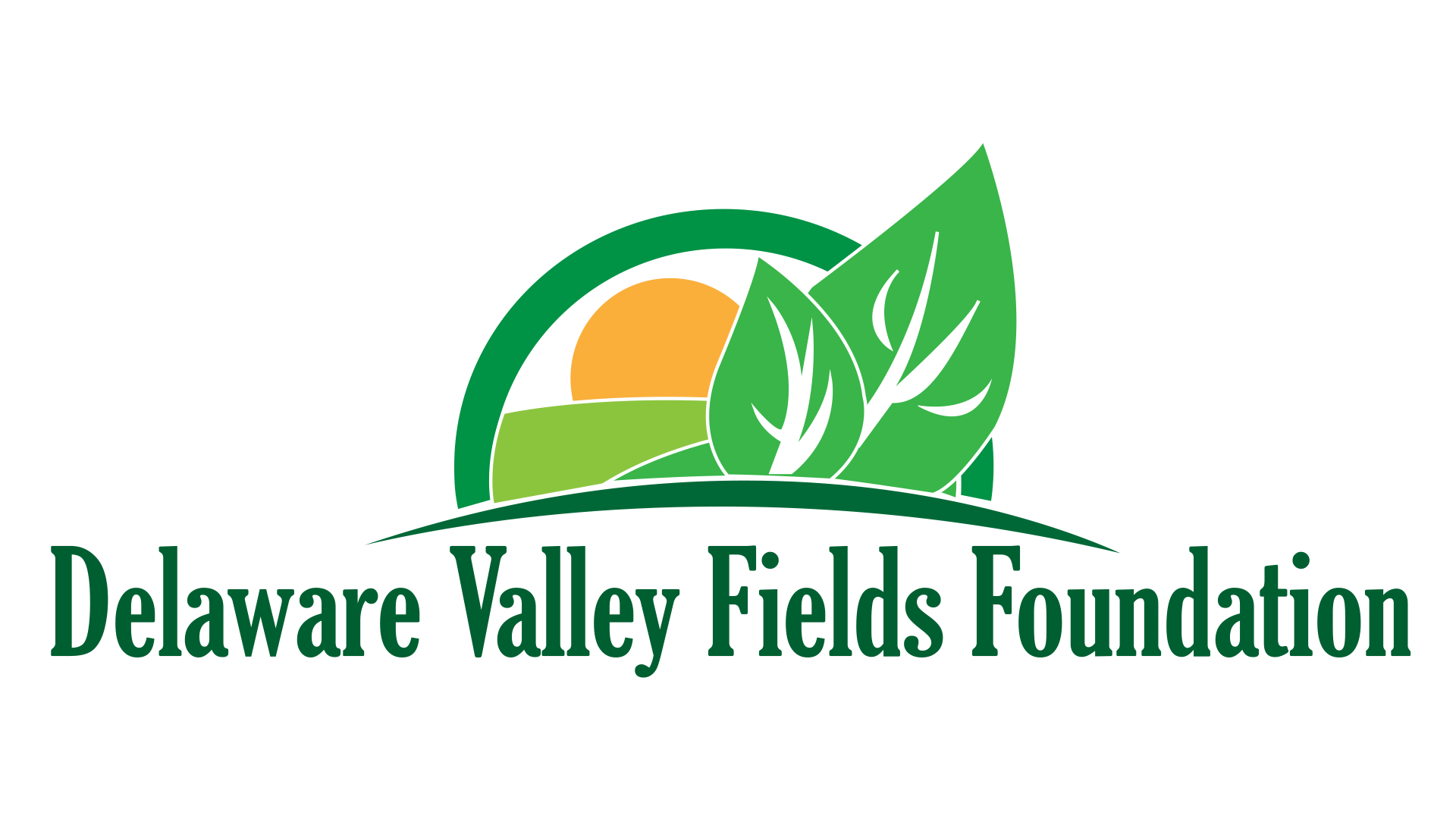There is a non-profit in Pennsylvania that is trying to help farmers make a profit. The Delaware Valley Fields Foundation, founded by Bucks County resident Laura Fields, is working to create new opportunities for local grain farmers.
About 5 years ago, Ms. Fields recognized there was a change happening in Pennsylvania politics that would benefit local farmers. An “old-made-new-again” industry is returning to Pennsylvania that has an immediate need for grain sources. That industry? Craft distilling.
Ms. Fields and her non-profit want to see Pennsylvania grain farmers benefit directly from this new demand.
Craft distilleries in Pennsylvania have grown from about 4 in 2010 to over 80 in 2018. This exponential growth provides a great deal of opportunity for local small grain farmers. To Ms. Fields, the connection between local farmers and local distillers was obvious.
“Not only are there deep distilling roots in Pennsylvania history, but grain production for these distilleries during the pre-prohibition era in Pennsylvania was off the charts”, explained Ms Fields. “There is an excellent opportunity for local farmers to capitalize on the burgeoning market, but there is a lot of work to be done to re-learn all that was lost.”
To bridge the gap between farmers and distillers, Laura Fields began an educational journey across Pennsylvania. Ms. Fields visited modern grist mills like Snaveley Mill, in Lititz, Pa, and historically restored mills like Castle Valley Mill, in Doylestown, Pa. to better understand pricing, shipping and availability of products. She met with farmers, agricultural business owners across the state, and toured over 45 Pennsylvania distilleries. Each experience helped to shape her non-profit’s ambition to re-connect these independent businesses with so much to gain from one another. New revelations about the needs of these businesses also informed the development of new projects for the Delaware Valley Fields Foundation.
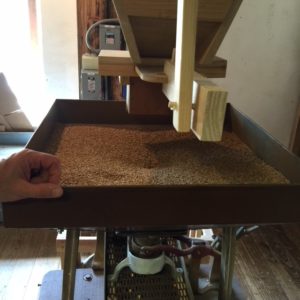
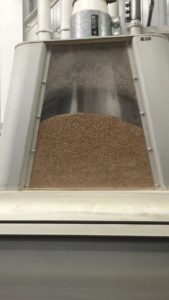
One of the lessons learned from those trips was, while there was great opportunity, no one was sure how to take the first step. Ms. Fields’ realization that someone would have to go first became the inspiration for the SeedSpark program. She would go first. The SeedSpark program would fund the production of heritage grains, create a seed stock, give it to local farmers and connect them with Pennsylvania distilleries. If SeedSpark would go first, what would it grow first? The answer came from a meeting with Erik Wolfe and his wife Avianna Ponzi, owners of Stoll & Wolfe Distillery in Lititz, Pa.
The head distiller of Stoll & Wolfe Distillery and part owner, Dick Stoll, had expressed an interest in using Rosen Rye in their whiskey recipes. He had been using Rosen at Michter’s Distillery in Shaefferstown, Pa, where he was head distiller until it closed in 1990. But the grain was no longer available in any significant amounts. After researching the grain, Ms. Fields found that Rosen Rye had, indeed, been used in large quantities at Michter’s Distillery into the 1970’s. They even advertised its use on their product labels. Since the distillery closed its doors, however, the grain lost its marketable value and was no longer planted or sought out. The only way to revive this rye varietal and help supply this young distillery’s demand was to rebuild a supply from scratch.
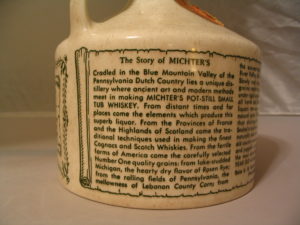
The DVFF sought out help from Penn State’s Agricultural Extension and began the SeedSpark Campaign to return this and other long-lost seed options to Pennsylvania.
For the last three years, the Delaware Valley Fields Foundation has been working with Greg Roth, Associate Department Head and extension grain crop specialist at Penn State’s College of Agricultural Sciences, to grow and develop effective farming practices in Pennsylvania for Rosen Rye.
This autumn, the work done by DVFF’s SeedSpark program will be demonstrated very clearly. Penn State University’s Agricultural Extension and the DVFF began with a tiny envelope of seeds from the USDA seed bank.
From the initial 4-gram packet of seeds, Penn State and Delaware Valley Fields Foundation have harvested over 400lbs of usable grain and gained knowledge on how Rosen Rye grows. The harvest will be split – part going to Stoll & Wolfe to be distilled into whiskey and part going back into to the experimental fields at Penn State to continue research.
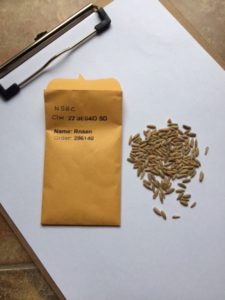
Each year, the agricultural extension’s test plots help to determine which farming practices/methods will ensure the most successful harvests for these heritage grains. This work to revive Rosen Rye for Stoll & Wolfe and Pennsylvania’s grain farmers is just the beginning.
Many new distilleries are interested in setting themselves apart with specialty grains and many farmers would be interested in profiting from this new demand. The “grain to glass” movement is growing more popular each year and so is its profitability.
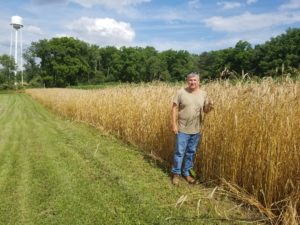
Recovering Lost Potential
This demand for grain by Pennsylvania’s burgeoning distilling industry is not a new phenomenon. Until 1920, distilling was one of the largest industries in the United States. The collection of liquor excise taxes alone made up about 40% of our nation’s income. Pennsylvania, with thousands of small, working stills and hundreds of licensed production facilities, was a major producer of rye whiskey (not to mention beer and other grain-based spirits). Every town that boasted a distillery was very aware of how much their local economy depended on grain supplies from local farms.
A huge blow was dealt to agriculture when farmers lost one of their biggest consumers. Meat and dairy farms also lost a reliable source of inexpensive animal feed by losing access to the distilleries’ spent grains. Franklin Roosevelt’s rise in popularity largely stemmed from his desire to put farmers back to work through his administration’s work to end Prohibition. Even those in government that frowned upon anything having to do with liquor had to admit that breweries and distilleries were very beneficial to the overall economy. The idea that a successful and thriving distilling industry is good for agriculture in Pennsylvania may not be a new idea, but it is a good one. There is a lot of potential for farmers here.
Distilling one bottle of 80 proof rye whiskey requires approximately 2 lbs of rye grain. There are about 56 lbs of rye in a bushel and in a reasonable yield, there are about 60 bushels of rye in an acre. That means that one acre of rye grain can produce 1680 bottles of whiskey. Talk about potential. Now, these are ideal conditions, but at least you can begin to see how a farmer with a successful harvest would be desirable to a distiller. Distillers are willing to pay more for better grain to make better whiskey. They want specialty grains, but they can’t find them because, either they no longer exist, or they don’t know where to look for them. These new distilleries will also need more grain as they begin to produce more product. While they may start off needing a few hundred pounds, they will eventually need many tons of grain to fill orders. Establishing relationships can help farmers keep their customers as the demand grows.
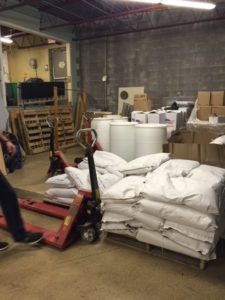
There is a great deal of potential for heirloom varietals of rye seeds that were once grown in Pennsylvania but have been missing for decades. Rye is specifically desired by distillers in Pennsylvania because of the deep connection to local distilling traditions going back to the 17th century. There were once many different varietals of rye grown that made distinct flavor variations in the many different whiskeys being made across the state. Unfortunately for our modern distillers, that variety is no longer available. The flavor of the cereal rye grain has not been a consideration by the farmer in many years. The Delaware Valley Fields Foundation hopes to work with farmers that are interested in helping these distillers fulfill their grain supply needs.
With the success of our farmers and distillers comes success for our local communities. Pennsylvania’s small business economy has always been allied with our agricultural industry. Our history is just as bound to the land as our future. Many distilleries are promoting the history of their towns and neighborhoods. Many towns have been home to famous distilleries that went out of business before Prohibition. In one famous case, the oldest distillery in the country, which was 237 years old when it closed its doors in 1990, was located in Lancaster County, Pennsylvania. That distillery was Michter’s Distillery- the same distillery that connects Stoll & Wolfe and Rosen Rye. New distilleries become chroniclers of their local histories and help the local population appreciate how much entrepreneurial spirit thrived during the earliest days of their town. Tasting rooms create exciting tourist destinations. New distilleries need farmers, millers, malt houses, barrel makers, machinists, electricians, metal workers, plumbers, distillery workers and tour guides. They bring tax revenue and investment dollars to small towns. They inspire local events and festivals. There is so much potential for growth in a town that invites a distillery to set up in their community and contribute to their economy.
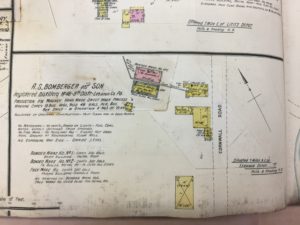
All this potential is why the Delaware Valley Fields Foundation will continue to make connections between farmers and any economic opportunities that arise. We aim to educate the public and those that can help to make a difference about the benefits that come from a strong farming community. New seeds must be planted every year. We hope to plant enough seeds in the ground and in Pennsylvania’s imagination to improve our farming communities. Please visit delvalfieldsfoundation.org and contact us for more information.
